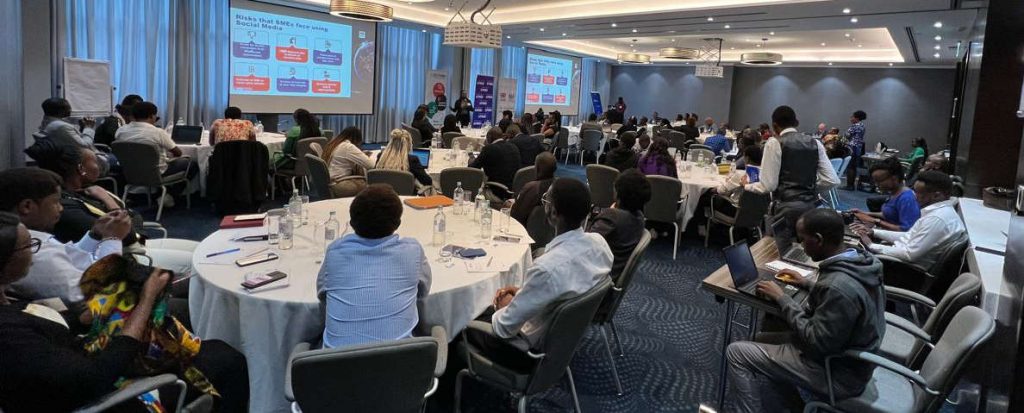Place: Nairobi Date: January 23, 2024, 9:00 am – 5:00 pm
KICTANet, in collaboration with KICTANet, KPMG, and the ICT Authority, supported by UKAid (FCDO), conducted an informative Cyber Hygiene Training for Trainers. The training, which targeted 80 participants within the Kenyan SME landscape, saw an overwhelming response resulting in an attendance of 95 individuals comprising owners, employees, and stakeholders of Kenyan SMEs. This attendance indicated the increasing interest in SMEs wanting to protect their digital assets. The four-session training immersed participants in critical aspects of cyber hygiene, providing comprehensive insights and actionable strategies for the present stakeholders.
Specifically, the training equipped the participants with the following skills and knowledge:
- Introduction to Cyber Hygiene: The first session introduced the audience to the Kenyan SME landscape and emphasized the increasing need for improved digital security. Key takeaways included the importance of Cyber Hygiene Governance, strategies for People’s Cyber Hygiene, compliance with Digital Laws, and creating a secure technology environment for data.
- Cyber Hygiene for Devices & Technology: This session delved into securing devices and technology, addressing tools for asset management, software and hardware management, secure connectivity, and the safe adoption of emerging technologies. Equipping SMEs with these skills is essential in navigating the ever-evolving digital landscape.
- Safe Adoption of Social Media: Recognizing the increasing use of social media by SMEs, the third session provided participants with skills for its safe adoption and use. Navigating social platforms while safeguarding sensitive information is crucial for sustainable business practices.
- Protecting Digital Finances in SMEs: The final session highlighted stakeholders involved in SMEs, offering practical cyber hygiene strategies for protecting their digital finances and transactions. Understanding the risks and implementing protective measures is paramount in an era in which many Kenyan SMEs primarily depend on online financial activities.
- Cyber hygiene toolkit: participants were also introduced to the Cybersecurity and Data Protection Toolkit for SMEs. This is a tool backed by the UK and Kenyan governments’ partnership to help SMEs in Kenya protect their businesses from cyber threats. The toolkit allows SMEs to access free products from trusted cybersecurity companies to improve their security. SMEs that wish to use the toolkit can access it using the following link: https://gcatoolkit.org/small-business-acpkenya/
There was active engagement by participants who were eager to ask questions and showed interest in further training to help them implement the newly gained skills to improve their digital security.
This training empowered the attendees to become cyber hygiene trainers themselves, amplifying the impact of the Cyber Hygiene Awareness Program. Armed with newfound knowledge and resources, these individuals will conduct cyber hygiene training within their respective organizations. This initiative helped strengthen SMEs against digital risks and threats but also contributed to the ongoing Cyber Hygiene Awareness Month.
The Cyber Hygiene Awareness program was a collaborative effort by the same partners to create a more digitally resilient Kenyan business landscape. It ran a successful campaign #CyberHygiene4SMEs using interactive multimedia content including posters, fact sheets, fliers, video animations and features, and podcasts. The campaign had a reach of 20 million unique viewers over two months.
SMEs can access further cyber hygiene awareness and training materials using the following link: https://tatua.digital/cyber-hygiene-awareness/

